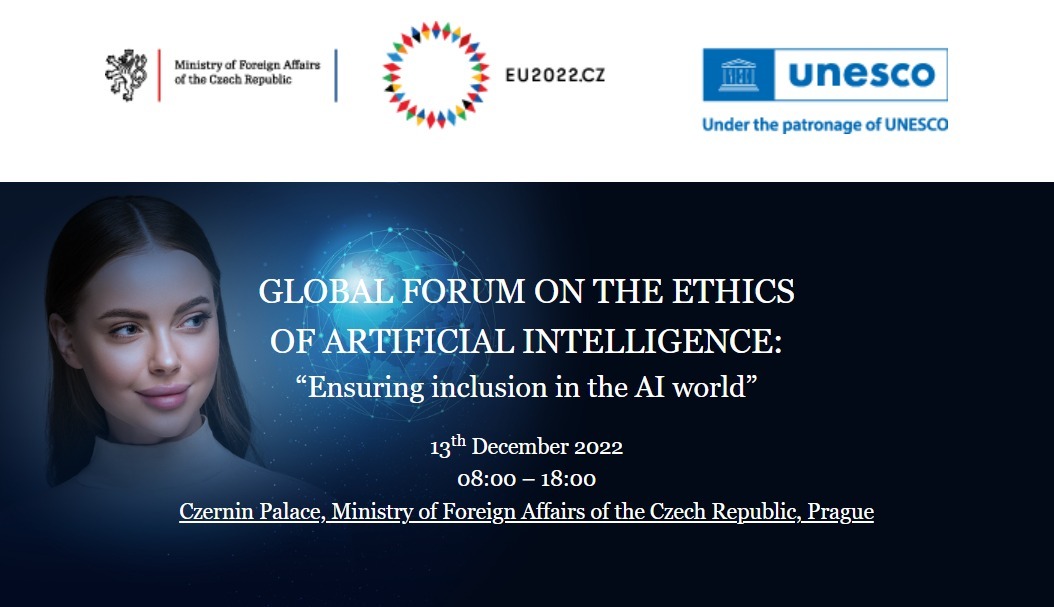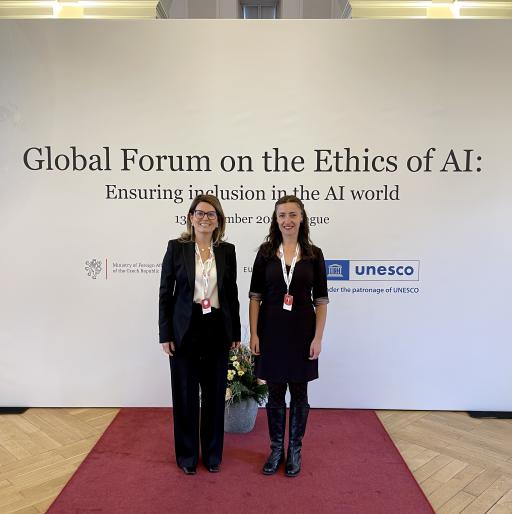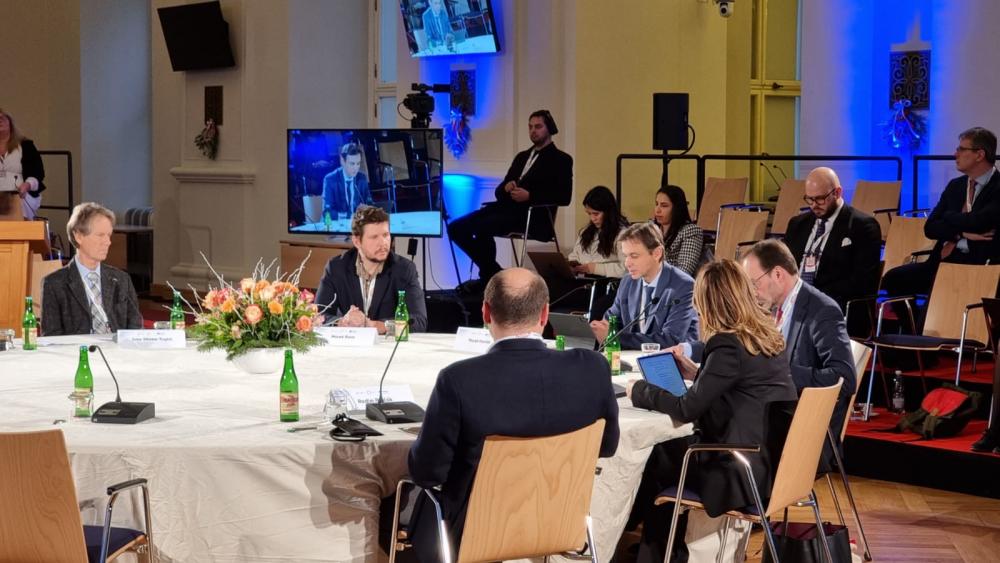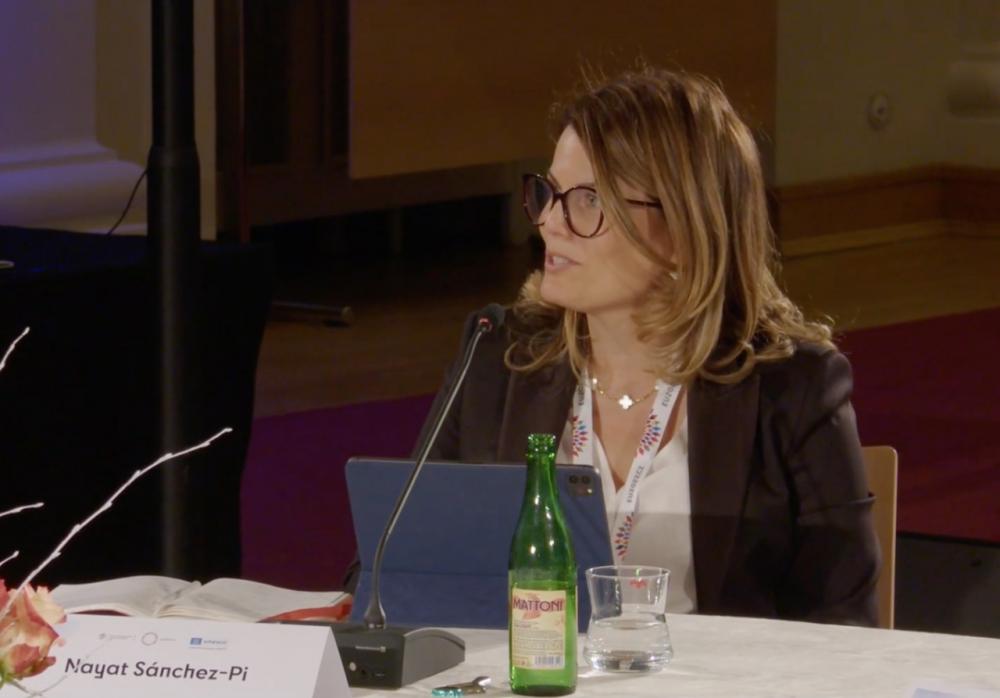The meeting was attended by political leaders and experts from around the world, including the undersecretary of the Ministry of Science, Knowledge, Technology and Innovation, Carolina Gainza, and the director of Inria Chile, Nayat Sánchez-Pi.

With the aim of "guaranteeing inclusion in the world of Artificial Intelligence" (AI) and taking stock of UNESCO's recommendation, the First Global Forum on the Ethics of AI was held in Prague, Czech Republic, on December 13, 2022, organized by the Czech Presidency of the Council of the European Union, under the sponsorship of the United Nations Educational, Scientific and Cultural Organization (UNESCO). The Forum was attended by numerous authorities from the governments of Argentina, Austria, Belgium, Chile, South Korea, Ecuador, Indonesia, Lithuania, Czech Republic, Romania, Slovenia, Spain and the United Kingdom, including the Chilean Undersecretary of Science, Technology, Knowledge and Innovation, Carolina Gainza.
Artificial intelligence is now part of the daily lives of people around the world, in areas as varied as education, work and health. AI has brought with it multiple benefits, but also challenges and risks associated with its misuse. In this line, in November 2021, the 193 Member States of UNESCO's General Conference signed the first global standard-setting instrument on artificial intelligence, the "Recommendation on the Ethics of Artificial Intelligence," and this First Forum marks an important milestone in building a strong international coalition to ensure the ethical development and use of AI worldwide, following the adoption of the Recommendation on the Ethics of AI in November 2021.
The Recommendation "ensures that digital transformations promote human rights and contribute to the achievement of the Sustainable Development Goals, addressing issues of transparency, accountability and privacy, with action-oriented policy chapters on data governance, education, culture, labor, healthcare and the economy."
The document mentions the Recommendation's areas of application; its aims and objectives; values and principles; and areas for policy action, among others. UNESCO points out that international and national policies and regulatory frameworks are needed to ensure that the development of this technology benefits humanity as a whole, and stresses the need to make AI human-centered, serving the interests of citizens, and not the other way around.
As hosts of the Forum, the Minister of Foreign Affairs of the Czech Republic, Jan Lipavský, together with the Director-General of UNESCO, Audrey Azoulay, and the Director General of the European Commission's Directorate-General for Structural Reforms Support (DG REFORM), Mario Nava, opened the meeting by referring to the complementarity and leading role of the EU and UNESCO in the normative and legislative work on AI.
Following this introduction, the Assistant Director-General for Social and Human Sciences at UNESCO, Gabriela Ramos, and the professor of Computer Science at the University of California at Berkeley, Stuart J. Russell, opened the discussion with two keynotes on "Setting the Stage: Staying Ahead in Ethical AI". The following Ministerial Session entitled "Global Collaboration for the Implementation of the UNESCO Recommendation on the Ethics of AI" was followed by the participation of the authorities of the countries that were part of the forum.
With more than 200 research teams and close to 4,000 specialist researchers, Inria is an authoritative and expert voice in this field, which is why, represented by its CEO, Nayat Sánchez-Pi, Inria Chile was part of the Forum's round table, entitled "Ensuring multistakeholder engagement in the Ethical Impact Assessment".
In addition to the CEO of Inria Chile, the event was attended by leading authorities, experts, entrepreneurs and leaders in the field: the Deputy Minister of European Affairs of the Czech Republic, Marek Havrda as moderator; the director of the International Research Center on Artificial Intelligence of UNESCO (IRCAI), John Shawe-Taylor; the advisor for artificial intelligence of the Directorate General for Communication Networks, Content and Technology or "DG Connect" of the European Commission, Juha Heikkilä; the director of the Institute of Law and Technology at Masaryk University, Radim Polčák; the chief of staff of the Information Technology Laboratory (ITL), National Institute of Science and Technology (NIST) of the United States, Elham Tabassi; the CEO and founder of GoodAI, Marek Rosa; and Lynn H. Kaack, assistant professor of computer science and public policy at the Hertie School and co-founder and president of Climate Change AI. They discussed international efforts to promote the development and ethical use of AI and regulatory best practices to ensure the ethical development of this technology.
Nayat Sanchez-Pi noted "we need this ethical evaluation work to be an integral end-to end part of the machine learning cycle and not something that is done at the end separately and disconnectedly. This is not a trivial problem to solve. We need more formal verification software systems for AI that carry certificates and safety proofs, and we should integrate ethical evaluation tools into the different operational machine learning pipelines, especially those opensource ones that have a large user base, e.g. scikit-learn which is used by a wide range of users, not necessarily the most technical and therefore those who benefit most from having these ethical boundaries built in automatically"; Furthermore, the director added that "This is a strongly transdisciplinary challenge and is a big cultural shift. We need to work together to make it a positive experience and ensure a proper adoption of AI (...) We are convinced that AI can accelerate progress in Latin America, but it can also deepen the social divide. So, spreading the vision of a true ethical AI and AI for social good will contribute in two ways: to reduce the gaps that the region reveals and, on the other hand, for Latin America to contribute to the development of ethical AI globally through cooperation and collaboration".
In another expert roundtable "Ensuring inclusion, transparency, and non-discrimination in AI through the Readiness Assessment Methodology" the Forum delivered innovative methodologies that seek to support the normative instrument and help countries understand their readiness to apply AI ethically and responsibly for all their citizens. This will allow, by applying and integrating them, to predict consequences, mitigate risks and address social challenges in accordance with the values and principles of the Recommendation, signed last year.



